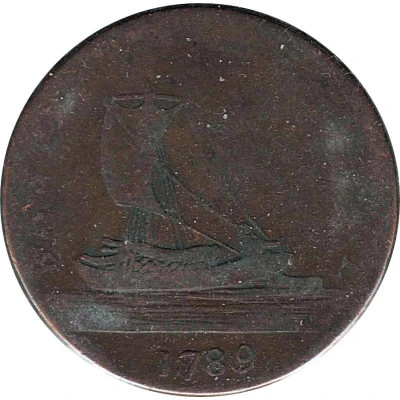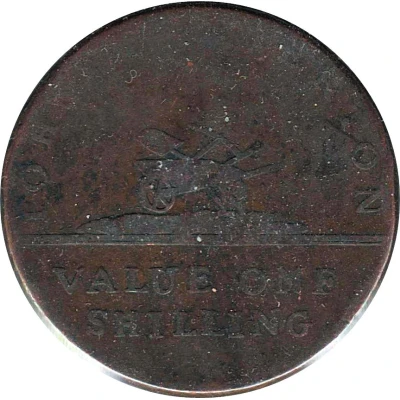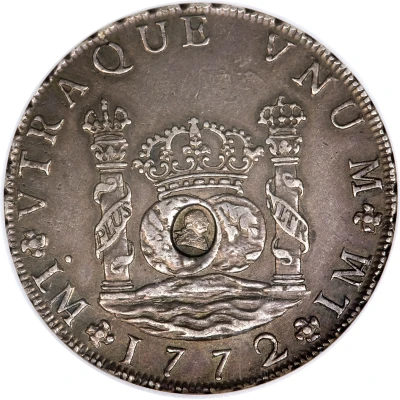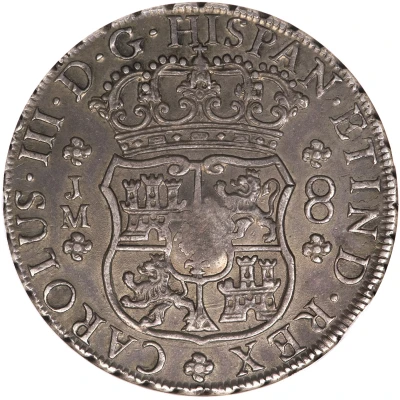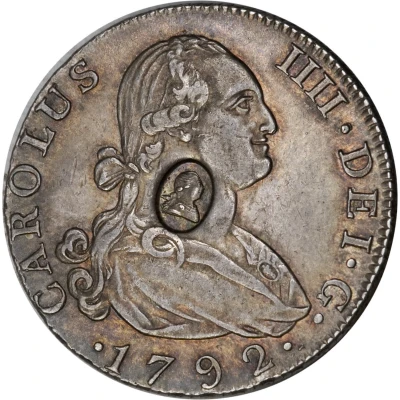


© Heritage Auctions
½ Dollar - George III Type I countermark; oval ND
| Silver (.896) | 13.5 g | 32.5 mm |
| Issuer | United Kingdom (United Kingdom, British Overseas Territories and Crown Dependencies) |
|---|---|
| King | George III (1760-1820) |
| Type | Standard circulation coin |
| Years | 1754-1792 |
| Value | ½ Dollar = 2 Shillings 4½ Pence (19⁄160) |
| Currency | Countermarked coinage (1797-1804) |
| Composition | Silver (.896) |
| Weight | 13.5 g |
| Diameter | 32.5 mm |
| Shape | Round |
| Orientation | Medal alignment ↑↑ |
| Demonetized | Yes |
| Updated | 2024-10-09 |
| Numista | N#13160 |
|---|---|
| Rarity index | 91% |
Reverse
Crowned shield of arms dividing denomination, legend around
Script: Latin
Lettering:
HISPANIARUM·REX·
R 4
M MF.
Translation: King of Spain
Engraver: Manuel de Lamas y Francisco Herrera
Comment
Countermarked CoinageEmergency issue of 1799 comprising foreign silver coins, usually Spanish Colonial, having a bust of George III within an oval. Countermarked 4 Reales circulated at 2 Shillings 4½ Pence in 1799.
Issuer: Bank of England; Countermark: Oval, Type I; Date: Dates shown are of the host coin.
Countermarked on Spanish and Colonial 4 Reales of Carlos IV:
KM#622.1 Countermark on Spanish (Madrid mint) 4 Reales KM#413.1 (1772-88) or KM431.1 (1788-1799);
KM#622.2 Countermark on Spanish (Seville mint) 4 Reales KM#413.2 (1772-88);
KM#A622 Countermark on Bolivia (Potosi mint) 4 Reales KM#54 (1773-89);
KM#B622 Countermark on Mexico City mint 4 Reales KM#97.2a (1785-89);
Countermarked on Guatemala 4 Reales of Ferdinand VI:
KM#C622 Countermark on Guatemala mint 4 Reales KM#17 (1754-60);
For more detail on these emergency issues, please read
The Bank of England Countermarked Dollars, 1797-1804 by H.E. Manville.
Interesting fact
One interesting fact about this coin is that it was issued during the reign of King George III, who was the King of Great Britain and Ireland from 1760 until 1820. During his reign, the British Empire expanded significantly, and this coin was likely used in trade and commerce throughout the empire. Additionally, the coin features an oval countermark, which was a unique feature of coins issued during this time period.
